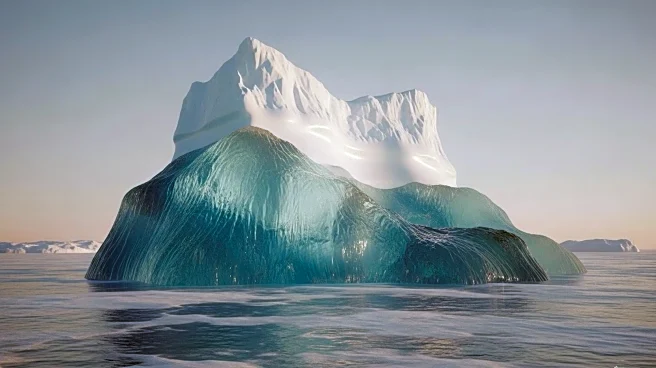What is the story about?
What's Happening?
Recent research suggests that Earth's climate system might overcorrect for global warming, potentially leading to an ice age. The study highlights the role of silicate rock weathering in regulating Earth's climate, where rain absorbs CO2 and dissolves minerals, eventually locking carbon in the ocean floor. However, the researchers found that this process alone cannot explain past extreme glaciations. Instead, nutrient feedback loops, particularly involving phosphorus and algae growth, play a significant role. As CO2 levels rise, more nutrients enter the oceans, fueling algae growth that captures carbon. This process, combined with oxygen loss in the oceans, could lead to a cooling overshoot, potentially triggering an ice age.
Why It's Important?
The findings provide new insights into Earth's climate regulation mechanisms and the potential long-term impacts of current CO2 emissions. Understanding these processes is crucial for predicting future climate scenarios and developing strategies to mitigate global warming. The study underscores the complexity of Earth's climate system and the need for comprehensive models that account for various feedback loops. As policymakers and scientists work to address climate change, this research highlights the importance of considering both short-term and long-term effects of human activities on the planet's climate.
What's Next?
Further research is needed to refine climate models and explore the interactions between marine sediments and atmospheric conditions. Scientists aim to understand why Earth's climate has recovered quickly from past perturbations and how these insights can inform current climate strategies. The study may prompt discussions on the role of natural processes in climate regulation and the potential for leveraging these mechanisms in climate mitigation efforts. As the global community seeks to limit warming, understanding the potential for natural cooling processes could influence policy decisions and international climate agreements.
Beyond the Headlines
The research raises questions about humanity's impact on Earth's climate and the ethical considerations of altering natural systems. The potential for an ice age, albeit in the distant future, challenges assumptions about the permanence of current climate conditions. This study highlights the need for a balanced approach to climate action, considering both mitigation and adaptation strategies. The findings also emphasize the interconnectedness of Earth's systems and the importance of preserving natural processes that contribute to climate stability.
















